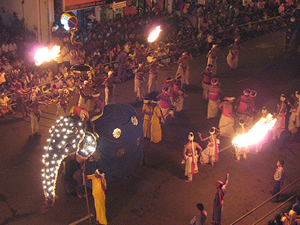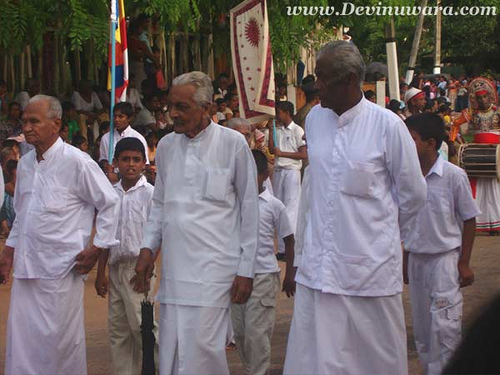Ilankai Tamil Sangam30th Year on the Web Association of Tamils of Sri Lanka in the USA |
||||||
 Home Home Archives Archives |
Perahera in Jaffna 2009by Charles Sarvan, October 28, 2009
1 Perahera in Jaffna.
Religious processions are usually conducted in order to affirm and strengthen the faith of a people: a Christian pageant usually takes place in a Christian region; a Buddhist procession among an essentially Buddhist population, and so on. But Jaffna is overwhelmingly Hindu. Secondly, this particular perahera was organised, conducted and controlled by the army. There was nothing in it of the Buddha’s teaching of love, compassion and peace. The perahera was not spiritual but yet another example of religion being put to political purpose. It was drama, a play deliberately “staged” to try to humiliate Tamils; to try to persuade them to accept that they are a beaten and conquered people; powerless even to protest peacefully. (Tamils, including those who were / are against the Tigers, will acknowledge that, during the time of the LTTE, though the Tigers had lost control of Jaffna, the Sinhalese government would not have dared display such contempt.) One of the pictures accompanying the report of the perahera reveals Douglas Devananda sitting in the front row, participating in the attempt to heap humiliation on his people. But this kind of behaviour is not peculiar to the Tamils of Sri Lanka. Why do we have the words “boycott” and “quisling” in the English language? They have now ceased to be proper nouns and have become modifiers, but what is their origin? Didn’t the Vichy government, composed of Frenchmen, cooperate with the Nazis who had conquered France? Haven’t puppets elsewhere and throughout time collaborated with occupying forces? It is not a Tamil, but a human, failing, albeit in a minority.
-------------------------------------
2 Reaction of some Tamils When confronted with total defeat and complete subjugation, facing (apparent) hopelessness, there is a tendency in some to turn to “self-blame”, even to “self-hate.” So it is that when I mentioned the perahera “dramatised” in Jaffna to a fellow Tamil, his reaction was to say that, recently, a Hindu festival was celebrated in Vavuniya by Tamils while not far away other Tamils endure the misery of concentration camps. “Given our innate Tamil nature, we Tamils have earned [deserve] what we’ve got.” This reaction too one has observed in other peoples, in other places, and at other times when confronted with defeat and apparent hopelessness. Instead of others blaming the victims (the “blame-the-victim” syndrome), it becomes an instance where the victims develop a sense of unworthiness; masochistically blame themselves. It is rather like an animal which, no longer able to attack the one who caused its injury; in pain and powerlessness, in frustration and despair, turns and bites its own wound. Besides, putting the blame on the (alleged) nature of the Tamils placates our conscience; becomes an excuse, enabling us not to take an interest, show concern or be active. Such emotional and psychological responses, though perhaps understandable, must be guarded against because they are not positive and constructive; because they do not build courage, give hope, strengthen resolve. On the contrary, they breed resignation, acceptance, inaction, passivity. At root, such reactions are surrender: “It is hopeless, futile. We deserve no better.” This becomes collaboration and cooperation with the aims and intentions of the oppressor. The Tamils of Sri Lanka are no better or worse than other human beings, and a struggle is lost only if the people, taking a negative and fatalistic attitude, give it up as hopeless. No people (Tamils of Sri Lanka included) “deserve” occupation, subjection and subordination; humiliation and exploitation. To remain detached when injustice is perpetrated is to become part of that injustice.
|
|||||
|
||||||

